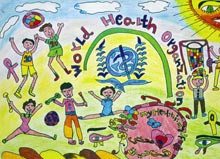 Is your city encouraging physical activity?
Is your city encouraging physical activity?
Check out how physically active you are
24 February 2014, Dubai – The World Health Organization (WHO), in collaboration with the Ministry of Health of the United Arab Emirates, held a two-day high-level regional forum on a life-course approach to promoting physical activity in Dubai, United Arab Emirates from 24 to 25 February 2014.
The forum was held with support from the United Nations Messenger of Peace and Chairperson of Dubai Healthcare City Authority, Her Royal Highness Princess Haya Bint Al Hussein, wife of His Highness Sheikh Mohammed Bin Rashid Al Maktoum, Vice-President and Prime Minister of the United Arab Emirates and Ruler of Dubai.
Forum participants included ministers of health, education, sports, youth and transport, as well as delegates from different sectors from 20 countries across the Region.
The forum comes within the framework of WHO’s efforts to reduce the risk of noncommunicable diseases (NCDs) through physical activity. Globally, 6% of deaths are attributed to physical inactivity. It contributes to up to 25% of breast and colon cancers, 27% of diabetes and 30% of heart disease.
In the Region, physical inactivity is a major concern. The Region is considered to have one of the highest rates of physically inactive people in the world. One in three men and one in two women are inactive. In order to increase the level of activity in the Region, experts in the forum will discuss ways to raise awareness and share successful experiences in promoting physical activity. Such activity can be done anywhere and at anytime, as it is not necessary to go to a sports facility to be physically active. It only takes 30 minutes of walking five days per week to improve and maintain health.
In the opening session, Dr Ala Alwan, WHO Regional Director for the Eastern Mediterranean, explained that the aim of the forum was to focus attention on the importance of increasing physical activity to promote health and to prevent diseases. “We also hope that this forum will witness the birth of a strong regional movement soliciting collective action to achieve healthy and active societies in this Region,” he added. The forum is an opportunity to share global and regional success stories and experiences in promoting physical activity, to draw lessons and “to agree on next steps for a multisectoral roadmap for promoting physical activity in countries of the Region”, Dr Alwan added.
During the forum, WHO launched a document "Promoting physical activity in the Eastern Mediterranean Region", which provides evidence-based information on the health risks of physical inactivity and suggests solutions that can be adopted by Member States based on assessment of current capacities in the Region. The document contains a series of case studies of physical activity projects from across the Region to highlight the types of action under way across a range of sectors and settings.
In addition, experts in health care, urban design, transport, education, worksite, sport, communication and mass media held parallel sessions to discuss multi-level, multisectoral policies and a framework for action for the Region on physical activity throughout the life-course.
Related links
High-level regional forum on a life course approach to promoting physical activity
Watch the video Move for health
Animated infographic on physical activity
Global recommendations on physical activity for health
Take the surveys
Is your city encouraging physical activity?
Check out how physically active you are
For more information, please contact:
Email:
Mobile: +201099756506


